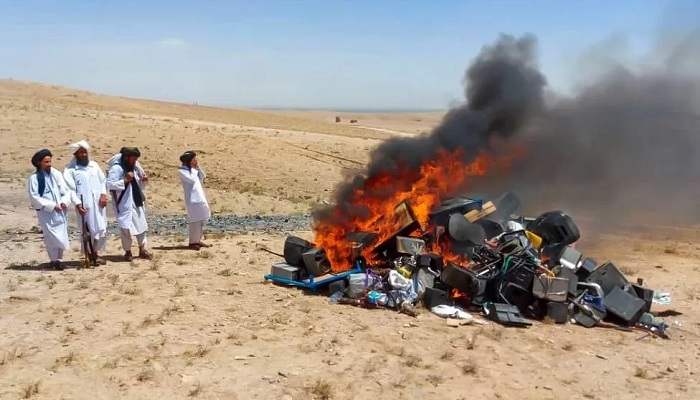Unsung artists mourn as Taliban burn piles of music instruments in Afghanistan
In western Herat province, musical equipment worth thousands of dollars was set ablaze on a bonfire
July 31, 2023

In Afghanistan, the Taliban has engaged in burning musical instruments, justifying their actions by claiming that music leads to moral corruption, BBC reported Monday.
In western Herat province, musical equipment worth thousands of dollars was set ablaze on a bonfire last Saturday.
Since assuming control in 2021, the Taliban has imposed several restrictions, including a ban on public music performances.
This cultural suppression has drawn comparisons to "cultural genocide and musical vandalism" by Ahmad Sarmast, the founder of the Afghanistan National Institute of Music.
Dr Sarmast, who is currently residing in Portugal, expressed his concern over the denial of artistic freedom to the people of Afghanistan, stating that the burning of musical instruments in Herat represents just one instance of the broader cultural destruction taking place in the country under the Taliban's rule.
Images available online show that among the items set on fire in Herat were a guitar, a harmonium, a tabla (a type of drum), as well as amplifiers and speakers.
These musical instruments had been confiscated from wedding venues in the city.
An official from the Taliban's Vice and Virtue Ministry justified the burning of musical instruments by stating that playing music could lead the youth astray.
This is not the first instance of such an event organised by the Taliban, as a similar bonfire of instruments took place on 19 July, though the exact location was not disclosed in the government's Twitter post.
During the Taliban's previous rule in Afghanistan from the mid-90s until 2001, all forms of music were banned from social gatherings, television, and radio.
However, in the two decades that followed, a vibrant music scene emerged in the country. Nevertheless, with the Taliban's resurgence in August 2021, many musicians chose to flee Afghanistan to escape potential persecution.
Reports indicate that singers and musicians who remained in the country have faced beatings and discrimination.
Under their interpretation of Islamic law, the Taliban has imposed various restrictions in the past two years.
Women have been particularly affected, as they are required to dress in a way that only exposes their eyes and must be accompanied by a male relative if they travel beyond 72 kilometres.
Furthermore, teenage girls and women have been prohibited from entering school and university classrooms, gyms, and parks.
Just recently, the Taliban ordered all hair and beauty salons across the country to shut down, viewing them as un-Islamic.











